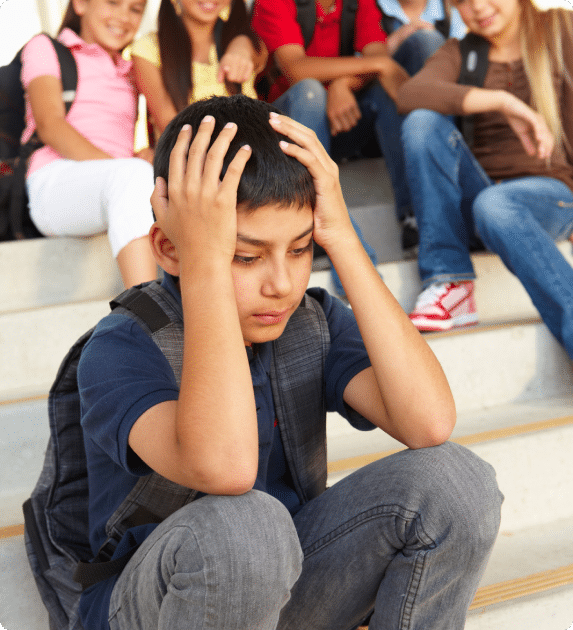Child Safety: Legal Support for Keeping Your Child Safe
Did you know that according to the Centers for Disease Control and Prevention (CDC), injuries and accidents are the leading cause of death of children and teenagers in the United States? In 2009, for example, over 9,000 individuals 19 and under were killed due to accidental injuries. Further, nearly 9 million children are injured in unintended accidents in each year, causing them to seek medical treatment in emergency rooms nationwide.

While no parent wants to receive a phone call that his or her child was hurt or involved in an accident, the good thing is that many child injuries are actually preventable. Organizations like the CDC, Safe Kids Worldwide, and the National Child Safety Council are dedicated to raising awareness of safety issues, educating the public, and taking action designed to keep children safe. Efforts to raise awareness and educate the public are aimed at people all across society – children, parents, guardians, teachers, administrators, public officials, and more.
Youth Violence Prevention
Youth violence is one of the most widespread epidemics that the United States faces. According to the Centers for Disease Control (CDC), violence is a leading cause of death for young people, and it results in over 500,000 children being medically treated each year. Youth violence is defined as violence either against or committed by a child or adolescent. Homicides are responsible for an average of 12 deaths each day across the country and are the 3rd leading cause of death for people between the ages of 10-24. Moreover, youth violence is estimated to cost society over $18 billion annually in medical costs and lost work income alone. This does not count costs associated with criminal justice, property damage, or the community cost to address the young victims, perpetrators, or their families’ needs.
Promoting Awareness Of Violence Among Children And Teenagers
As a parent, teacher, or administrator, it is important to know that the best way to prevent youth violence is to stop it before it starts. Youth violence is often first noticed at the toddler ages. While most children grow out of it and learn to cope with their problems using alternative means, some children continue to demonstrate aggressive behavior as they get older. Many times, this behavior is due to family problems or issues with peers. Youth violence can take many forms – bullying, harassment, fighting, dating violence, domestic child abuse, gun violence and self harm are just a few areas that encapsulate this country’s youth violence.
Strategies To Prevent Youth Violence
Managing youth violence generally starts at the child’s home. However, schools and community organizations can also take steps to stop the issue. Below are a few ways parents can work with their kids to prevent them from acting in a violent manner.
Promote a healthy environment for your family. Families that lack structure, supervision, caring relationships, open communication, and stability provide an environment for aggression and stress for youth.
Prioritize education early in life. It is recommended that kids start school as soon as they are eligible. Quality early education environments promote social skills, cognitive development, strengthen connections to school, and can reduce problems at home.
Take active roles in your children’s schools. Talk to teachers and staff about how your child interacts with peers, fellow students, and school staff. By volunteering for school-related trips, activities and organizations, you can see firsthand how your child interacts with others.
Actively talk with your children and listen to their concerns – not only when conflict arises, but daily. Set clear expectations and communicate clearly the issues with violence. Provide positive feedback when your child restrains from using violence in a difficult situation.
Know your children’s friends and peer group. Many times, violent behavior will be associated with the crowd in which the child is associated.
Keep children involved in extracurricular activities such as sports, theater, art, music, or other community organizations that cater to youth.
Overall, youth violence is preventable if parents, family members, teachers, educators, administrators, and community stakeholders work together and with our children to provide the necessary resources they need to develop and grow. Always lead by example and set clear expectations regarding the correct way to behave.
Bullying Prevention
Bullying has become a major problem among young children and teenagers in recent years. Bullying is most common among middle school children, as 25% of public school students have reported bullying at least once a week. Further, 20% of high school student reported being bullied on school property within the past year. For many years, bullying was a problem primarily confined to schools. Once children left school property, they were generally safe from bullies. However, with the widespread usage of cell phones and social media, bullying can now occur virtually anywhere, and 16% of children reported having been bullied electronically within the past year.

How Can We Stop Bullying?
Studies have consistently shown a strong link between bullying and suicidal behaviors. Bullies, their victims, and witnesses are all more likely to report high levels of suicide-related behaviors. In order to combat bullying, many schools have initiated prevention programs. Such programs have proven helpful and have decreased bullying by up to 25% in those schools.

Aside from prevention programs, what are other ways to decrease bullying? Teachers play a large role in bullying prevention. Unfortunately, the vast majority of children who are bullied do not report it. On average, only about 36% of victims report being bullied to a teacher, most likely due to shame or fear of retaliation. When a student does report being bullied, studies show that the most helpful actions a teacher can take is to listen to the student, give the student advice, and then check in on them periodically to make sure the situation gets better. Teachers should never accuse the student of tattling or tell the student to solve the problem on his or her own.
Child Internet Safety
It should come as a surprise to no one that the Internet can be a dangerous place. Sure, the Internet allows you to access information at your leisure and connect with people in faraway places easily; however, you never know who may try to access you for harm. These dangers are magnified when children utilize the Internet, as they often are not aware of warning signs of danger. Children can easily stumble upon fake news, pornographic content, scams, and seedy individuals, even when their voyage into the cyber world began with an innocent search. Nowadays, the Internet is easily accessible to people of all ages, especially as smartphones and tablets continue to increase in popularity.
- How To Promote Child Internet Safety
The Children’s Online Privacy Protection Act (COPPA) is a federal law designed to protect those under 13 years of age on the Internet. Websites must follow specific rules and privacy policies. While the government wants to protect children, parents can take steps at home as well. Before allowing your child to access the Internet, here are some things to keep in mind.
- Always Supervise Their Activity
First, make sure that you always have access to your child’s computer. Ideally, young children should only be able to access computers in common areas of the home. Although older children may require personal laptops for school, do not allow them to set their own passwords for the computer operating system, social media sites, or e-mail. Check in with your children frequently about their interests and the websites they are visiting or posts they are “liking” or making online. Review their webpage history through their Internet browsers. If you see something that gives you pause, talk to them about it. If you notice cyber bullying, contact the school or local law enforcement authorities. If you see that your child is cyber bullying others, discuss why that is unacceptable and inappropriate behavior, and restrict their computer and Internet access accordingly.
- Teach Children To Protect Their Privacy
Many children are easily trusting and do not understand the full consequences of sharing information online. If you start teaching children while they are young, they will be better prepared to resist sharing certain information from an early age. Make sure your children know:
- Never provide sensitive information, like their name, address, phone number, e-mail address, password, school name, nor any pictures to anyone for any reason without your permission, and never agree to meet up with anyone they meet online. Advise them that they never know who they may be talking to online, and dangerous people from the Internet who pretend to be children may try to find them and hurt them.
- Never open e-mail messages from people they do not know. Advise them that certain e-mail messages contain viruses that may harm the computer or steal certain information contained on the computer.
- Never respond to hurtful or disturbing messages. Advise them that if they see a hurtful or disturbing message, to let you know immediately.
The Internet is mainstay in our society, so it makes sense to teach our children how to access such a crucial resource safely. If you suspect that your child may be in danger through Internet usage, contact your local law enforcement authorities immediately.
School Safety Considerations
Principals, administrators, teachers, and school staff members undergo annual training to ensure they remain aware of ways in which kids can suffer harm on school grounds. Like any other area, awareness of risk is critical when it comes to taking steps to prevent future problems. Below are ways in which students can be in harm’s way at a school.

School Procedures
School districts, in addition to individual schools, should have plans in place in case of an emergency. The most common example is a fire drill. However, having a plan is not enough, which is why schools regularly conduct fire drills and train teachers how to execute the plan in case of a real-life emergency.

Playground Injuries
According to the Centers for Disease Control & Prevention (CDC), over 200,000 children under the age of 14 are treated in emergency rooms each year. Nearly half of these injuries are significant fractures, concussions, and amputations. Many playground injuries are caused by falls, but kids can also get hurt while using playground equipment such as swings, ladders, and slides. Students may also suffer concussions or head trauma while playing sports during recess or PE class.
Backpack Safety
Backpack safety is often overlooked. Textbooks are heavy, and students whose bodies are still developing may have trouble carrying them each day. Heavy backpacks can cause back pain, shoulder pain, and poor posture, which is one reason many school districts utilize technology such as digital textbooks. Regardless, it is important to select the right backpack. Parents should make sure backpacks come with features such as padded shoulder straps, multiple compartments (to properly distribute weight), and hip and chest belts.
Lab Accidents
Most middle and high school students enjoy science classes, including biology and chemistry, because they can partake in lab experiments and dissections. Of course, safety comes first. If proper precautions are not followed, students can suffer chemical burns or cuts to their body. To prevent lab accidents, teachers should ensure equipment works as intended, wear proper safety gear (gloves, goggles, etc.), clearly explain the experiment to students, and show students how to access and use safety equipment like emergency eye wash, fire blankets, and exhaust hoods.
Bullying and Violence
Bullying is defined as “unwanted aggressive behavior among school aged children that involves a real or perceived power imbalance.” This is a disturbing trend that has long-term consequences. Unfortunately, bullying can start at an early age and continue through high school. Examples of bullying include using threats, spreading rumors, physical attacks, and cyber-bullying. Bullying can lead to victims suffering from low self esteem or in extreme circumstances, suicide. To stop bullying, safety experts encourage teachers and students to stand up to this behavior and intervene on the victim’s behalf.

Carnival Safety
Children all across America look forward to the time of year when the fair rolls into town – the rides, animals, food, and games are enough to make any child (or adult) excited. Many local fairs, festivals, and carnivals are held at amusement parks. According to the U.S. Consumer Product Safety Commission (USPS), more than 30,000 children were treated at emergency rooms in 2016 due to injuries linked to amusement parks. These injuries ranged from minor bruises to broken bones to death.
Safety Tips For A Fun Fair Experience
Although it is easy for children to get lost in all the hype, it is important to keep some tips in mind to ensure a safe and enjoyable experience.
Safety Tips For A Fun Fair Experience
Be sure to supervise your children to ensure they are riding on age and height-appropriate rides. Rides have height requirements for a reason, and although there are safety bars and harnesses on many rides, they are not designed to fit people under a certain size, so be sure that your child reaches the minimum height requirement before allowing them to ride on a ride. This tip applies even if you are riding with your child – do not allow your children to ride rides for which they do not meet the height requirements. If a child slips out of a ride while it is activated, they can be seriously injured.
Also, just because a child is in a fun-designated environment does not mean that “anything goes.” Do not let your child climb fences or access areas that are specifically cordoned off from the public.
Ensure the emotional readiness of your child before allowing him or her to board certain rides
Even if your child meets the ride’s height requirement, a ride still may be too extreme for them. Watch the ride before choosing to board it and review the warning signs together to make sure your child is prepared for what to expect. If you suspect that your child may get frightened on the ride, ask the ride operator whether many children your child’s age frequently ride the ride. If the ride operator seems skeptical, it may be best to choose a different ride. Once a ride has been activated, it can often only be stopped in emergency situations and children who get scared and try to get off a ride while it is still moving can get injured.
Designate Meeting Spots
Of course, parents should always supervise children at a carnival or fair. Still, it is a good idea once you enter the fairground area to designate a meeting spot should you get separated from your child. With so many people in a limited area, it may be easy for you to lose sight of your child, or for your child to mistake a stranger for you once getting off a ride, and then get lost. In this scenario, it would be ideal to be able to meet up at a landmark that is easy to find. Upon entering the park, choose a bright and memorable meeting spot and instruct your child to only ask people in fair uniforms, ticket booth attendees, or police officers for directions to this meeting spot.
We all want our families to have memorable, but safe experiences at the fair. Should your child get injured or become lost while at the fair, inform the fair operators and police immediately.
Teens & Alcohol
According to the Centers for Disease Control and Prevention (CDC), alcohol is the most commonly used and abused drug among youth in the United States. Approximately 11% of all the alcohol that is consumed across the Unites States is by teens, and 90% of this alcohol is consumed by binge drinking. Binge drinking is the act of consuming alcohol with the intent of becoming intoxicated over a short period of time. Because of this, on average, teen drinkers consume more alcoholic drinks per occasion than adults do. Drinking at an early age often leads to alcoholism. Recent studies show that if teens start drinking between the ages of 15 and 16, they are five times more likely to become alcohol dependent as adults compared to those who started drinking at the legal age of 21. Additionally, these teens are five times more likely to drop out of school.
All that being said, teen drinking has actually been on the decline since the 1990’s, with 2015 marking a historical low in terms of teen alcohol abuse. However, teen drinking is still a problem. On average, over 4,300 teenagers die every year due to an alcohol-related accident. Roughly 33% of these deaths are due auto accidents, 33% are due to homicides, and the rest are due to suicides, drownings, falls, and alcohol poisoning. These staggering figures are why organizations like Mothers Against Drunk Driving (MADD) and Students Against Destructive Decisions (SADD) are dedicated to fighting against teen alcohol abuse.
